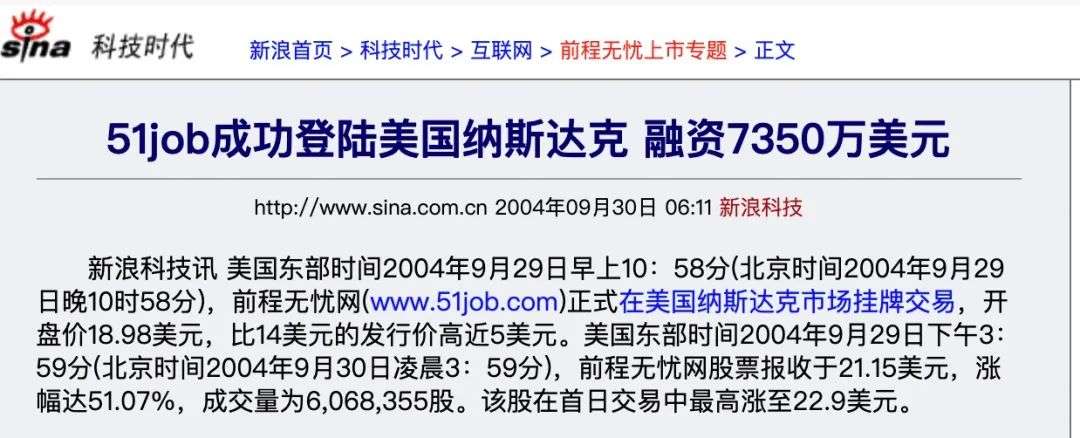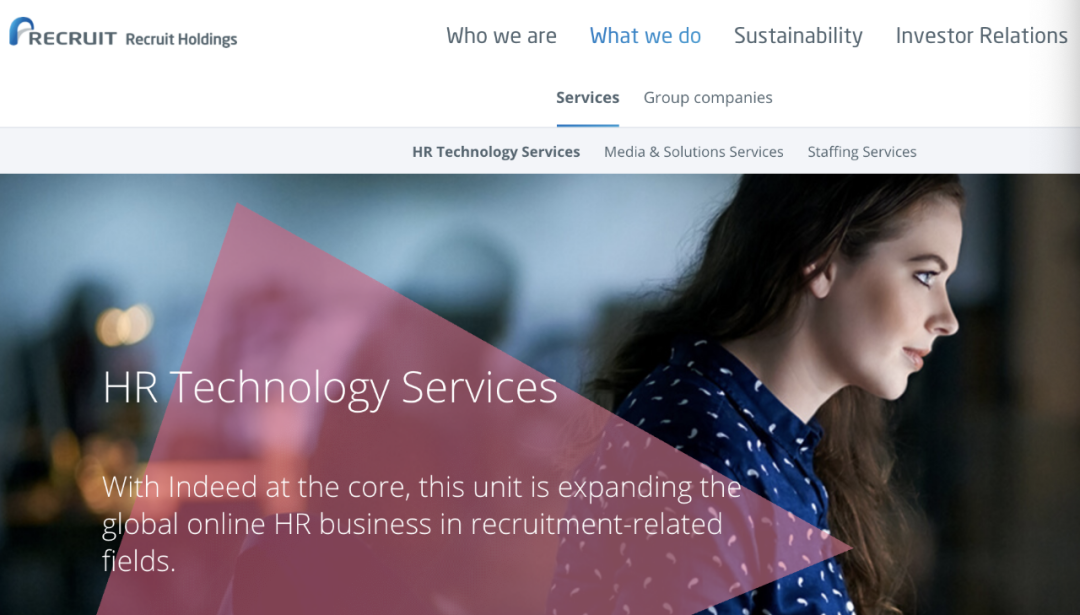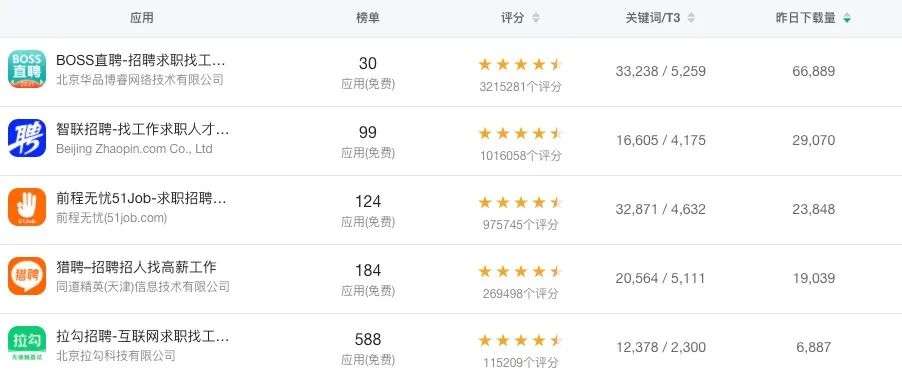How should the online recruitment industry go in the second half?
Editor’s note: This article is from the micro-channel public number “new eye” (ID: xinmouls), Author: Panax, Editor: perch.
A cold knowledge of gold three silver four: the recruitment industry is one of the earliest Internet-based industries, and it is also one of the earliest profitable industries on the Internet.
In 1997, Zhilian, a headhunting company, founded Zhilian Recruitment Network in Beijing, and was the first to try to carry out headhunting services through the Internet; in the same year, ChinaHR.com was established in Beijing; in 1999, 51job.com was established. Earlier than today’s thunderous BAT.
While QQ is not profitable, companies that have prepared budgets to advertise on recruitment websites have lined up. In 2004, 51job.com officially landed on Nasdaq in the United States. Its share price rose 51.07% on the first day, becoming the Chinese business card of Wall Street.
Report on the listing of 51job.com
Almost at the same time, Tencent, which went public, was rarely paid attention to. Baidu’s listing will be one year later. At this time, it is three years before Alibaba first listed in Hong Kong.
At that time, everyone thought that online recruitment was a good business.
According to the revenue of the headhunting industry, companies are willing to pay 10%-25% of their annual salary in order to acquire talents. The United States has a total population of 300 million, and LinkedIn sells for 170 billion yuan. Japan, with a population of 126.5 million, also gave birth to the Recruit Group with a market value of 540 billion yuan.
China has nearly 900 million people of working age and more than 44 million companies. The size of the recruitment market is expected to surpass that of the United States and Japan. No matter who solves the difficulty of finding a job in China, there is a chance to become a world-class company.
However, 20 years later, BAT has become an Internet giant. The fields of service information acquisition, commodity acquisition, and social interaction exist in the daily life of every ordinary person. Few people pay attention to and mention it on contemporary recruitment websites. 2020, no futureThere is news of the closure of 11 city offices. According to its annual report, the number of online service employers has decreased by more than 60,000 in the past year.
In the 2021 Golden Three Silver Four recruitment season, 51job has a market value of US$4.3 billion and Zhaopin’s valuation of US$1.7 billion. The Hong Kong Stock Exchange HR’s first listing of Liepin suffered a break, with a market value of 10.4 billion Hong Kong dollars so far. Another Shenzhen Stock Exchange listed company that specializes in headhunting services has a market value of only 10.677 billion yuan. The total amount does not exceed RMB 70 billion.
Capital seems to no longer believe that online recruitment is a good business.
All signs have shown that the current market value pattern of online recruitment is not a problem of market size, but that the first batch of mainstream players have missed the growth dividend.
In addition to the market value of recruitment platforms, there are always young people on social networks who ask their souls: Why is it so difficult to find a suitable job?
At the same time, innovation in the field of Internet recruitment is still sprouting endlessly. From Lagoo, which focuses on vertical recruitment on the Internet, and Chitu, which closed research and development by LinkedIn China, to direct hiring by BOSS who “look for a job and talk to the boss directly”. There are victories and defeats, but there are always people who try to answer the soul torture one after another.
2020 recruitment website advertisement
So, what kind of business is online recruitment in China?
Why did online recruitment catch up with the first bus of the Internet, and now it seems to be chasing the taillights of the mobile Internet?
When will the problems of finding a job and recruiting be solved?
Where will the new additions to this track be?
01
What are the Chinese recruitment websites missing?
Technology shapes the shape of the industry.
The first batch of Internet offerings were only the connection of information, such as Jack Ma’s China Yellow Pages, the four major portal websites, navigation stations, and recruitment websites.
Among all information docking services, recruitment information is the most commercially valuable. The company pays the recruitment website to let job seekers know that the company is hiring. Many job applicants have submitted their resumes, and the platform can package and sell these resumes to third-party companies.
Worry Future’s net profit in the first half of 2004 exceeded RMB 3 million. In the era when BAT didn’t know how to make money, this was almost a runaway.
It is not difficult to sort out the history of Internet developmentIt can be seen that all companies are expanding horizontally, vertically from information docking to service docking to deepen the closed loop. Taking e-commerce as an example, the horizontal sinking from the city to the countryside, the vertical from the information docking, to the closed loop of supply chain management, third-party payment guarantee, logistics, and after-sales delivery.
In the field of recruitment, the normal logic is a closed loop from city service to township, from information connection of recruitment, to corporate consulting and talent delivery.
But a real problem is that the services of traditional recruitment websites require companies to configure special HR for docking. This isolates most of China’s small and medium-sized enterprises.
From a vertical perspective, the process of candidates entering the company is itself a two-way selection process. It involves multiple subjective factors such as salary expectations, job functions, talent personality, and boss preferences.
The e-commerce platform can at least control the supply side (commodities), while the recruitment platform cannot control both supply and demand.
For recruiting companies and job seekers, 1,000 people have 1,000 Hamlets in their hearts. There is a mismatch in demand between the recruiting companies and job seekers. College students want to go to major Internet companies. Hope to find skilled workers.
For example, there are 1,000 college students and 1,000 skilled workers in the market, but only 100 positions are available for college students, and 1,900 positions require skilled workers. Then companies will find it difficult to recruit, and college students will find it difficult to find a job.
Japan Recruit Group official website
In the United States and Japan, urban and rural areas are not very fragmented. Linkedin has the accumulation of professional data, and the Japanese Recruit Group has also completed the closed loop of young people’s work, life, marriage and love data after graduation through the industrial layout.
Whether it is vertical expansion or horizontal expansion, these directions are beyond the imagination of Chinese online recruitment websites.
The daydreamer will imagine that if the profitable 51job and Zhaolian Recruitment in 2004 incubate a Chinese version of “LinkedIn”, or follow the practice of Recruit Group in Japan, take the lead in investing, from recruitment to marriage and local life. Then there should be nothing about Meituan. If they expand the model to be usable even if they are not HR, there will be no direct hiring of BOSS today.
Fantasies are fantasies after all. The above-mentioned measures, no matter what, means high capital and technology investment.
In the early years of Worry-Free, Zhaopin’s recruitment, major shareholders wereForeign investors. 51job.com’s largest shareholder is the Japanese Recruit Group, and Zhaopin’s largest shareholder is the Australian Seek Group.
Although the Chinese management team has a deep insight into the opportunities of China’s 900 million working population, just like the situation of all foreign Internet companies in China, what they lack is not foresight.
The final result is that there is no substantial innovation in product technology and business models, and traditional recruitment platforms are caught in a growth dilemma. 51job.com’s 2019 annual report shows that the number of corporate customers served by the company has declined for two consecutive years, and currently stands at around 420,000. It accounts for about 1% of the number of Chinese companies.
02
After all this talk, how can I find a good job?
While traditional recruitment platforms are frustrated with the capital market, the phenomenon of difficulty in recruiting and finding jobs in my country has not disappeared.
Why is it difficult to find a job and to recruit?
The accurate description of this question is, why is it difficult to find the right job and recruit the right talent? What is suitable is “right” in ordinary people’s words. The expectations and skills of talents are “matched” with the requirements of the boss.
In the PC Internet era, technology is not mature. More solutions are artificially narrowing the pool of talents that can be screened. For example, cutting out vertical industries, such as Lagou focusing on the Internet; or cutting out categories, focusing on high-end talents. Or use the endorsement of acquaintances and colleagues to complete the screening of people, such as LinkedIn.
In 2011, when the train of the mobile Internet slowly approached people, this problem had a new solution—algorithm recommendation. Each person has a mobile phone, and the system has the opportunity to “understand” a job seeker and a recruiter through desensitization behavior data. So as to accurately recommend to the other party.
“Black Mirror” once interprets that a couple chooses to date in reality after simulating tens of thousands of situations in the virtual world and still being together. For the recruitment platform, the ideal state is that after the recruiter’s “agent robot” has successfully contacted the job applicant’s “agent robot”, the two parties will start communication.
Black Mirror stills
As Caesar said, people can only see the facts they want to see.
In the first three years of the rise of the mobile Internet, the recruitment industry generally believed that recruitment, which happened in the office, could not be realized on the mobile side. It wasn’t until the direct recruitment of BOSS that “let the boss talk directly with job applicants” based on intuition, that the recruitment industry accidentally caught up with the train of mobile terminals and algorithms.
Another breakthrough brought by the mobile terminal is the popularization of recruitment services. Traditional recruitment platforms actually serve only a small number of companies with HR and urban white-collar workers. As a traditional recruiter, 51job.com has a corporate penetration rate of only 2%.
The two major characteristics of mobile and personalization allow more people to become recruiters, allowing job hunting to happen at all times, and intelligent recommendation among people becomes possible.
By 2021, mobile APP has become the standard for all players in the recruitment industry.
The spring of the industry seems to be here again. After all, recruitment is very important for every company. This is a rare TOB and TOC format; it has both the TOB service capability and the TOC service DAU.
From 2013 to 2016, the two platforms of BOSS direct employment and Lagou emerged, and LinkedIn became a red rabbit, and the industry became more enthusiastic. But from today’s point of view, Lagou sells his life without any worries. After Shen Boyang left the eggshell, there were fewer vertical and social discussions, and the industry cooled down. The BOSS who insisted on making recommendations survived directly. According to third-party data, their monthly utilization exceeded 3 million.
In the spring of 2021, recruitment APP downloads are hot
Behind the twists and turns are the complex problems faced by the online recruitment industry. The problem of labor difficulty is not rushed for a while.
On the one hand, the job search process is too long, there are too many random factors, and there are more than one job search channels for talents, and it is difficult for the business to form a closed loop. On the other hand, no matter how strong the recruitment platform is, no one will be able to influence the supply and demand relationship in the market. When there are only two financial companies and two companies that need manpower in the market, no one is destined to be satisfied.
In the Internet era, data has become an important productivity. For online recruitment software, more user data means higher value. With sufficient user data, online recruitment software can use applicants’ past jobsThe frequency of working experience and changing jobs to match people and positions, to a certain extent, also avoids the risk of frequent job-hopping for the company. Of course, the real-time, security and authenticity of these data are also what online recruitment companies need to pay attention to. .
03
Where will the online recruitment industry go in the second half?
What is certain is that the second half of the online recruitment industry is definitely not purely moving from a vertical platform to a comprehensive platform. It’s a contest between technology and security.
Compared with vertical platforms, comprehensive platforms can provide companies and job seekers with more comprehensive services. But when the online recruitment platform becomes a comprehensive platform, whether the ecological norms of the platform can be ensured is a problem that every online recruitment company needs to pay attention to. For example, a national recruitment platform has been exposed to false recruitments many times. Some recruitment companies ask job seekers to interview under the guise of recruitment, but when job seekers actually go to the interview, they find that it is a fake recruitment scam that charges fees.
On the technical side, various online recruitment software can start with mobile artificial intelligence and big data to strengthen the algorithmic mechanism of search engines. Taking BOSS direct recruitment as an example, the BOSS direct recruitment big data team was established in March 2015, and then added an NLP center in 2017, so as to use cutting-edge technologies such as artificial intelligence and big data to support business model innovation. In July 2018, Chief Scientist Xue Yanbo joined and led the establishment of the CSL (Career Science Lab) professional science laboratory.
Industry insiders revealed to Xinmo that the current profitability of online recruitment platforms is mainly from B-end companies, and most of the revenue comes from corporate annual fees and advertising revenue. C-side member income cannot be the mainstay supporting the business flow of online recruitment companies. Even if various recruitment platforms provide fee-based services such as establishment and optimization, job seekers obviously do not buy it, and B-side income is still the main source.
At the same time, it is a fact in the industry that advertising expenditures for C-end consumers are increasing year by year. However, most job seekers will choose multiple recruitment platforms to cast their nets extensively, and uninstall the recruitment software after the job search is completed. Therefore, how to achieve user retention and increase user re-download rate is the problem to be solved by current recruitment software. A single type of service cannot retain users.
In the second half of online recruitment, there are not only the issues of platform ecological regulation, technological development and profitability, but also the need to continue to exert efforts on the marketing side.
Through the combined communication mode of “two micros, one shake and one focus”, because for the online recruitment industry, whether it is a comprehensive online recruitment platform or an emerging platform focusing on vertical fields, the ultimate goal is to break the circle Growth and user retention.
For the marketing side, the equally important means is the groups that need marketing touch. Related reports show that most of the users who use online recruitment platforms are young adults in the workplace, 25-






